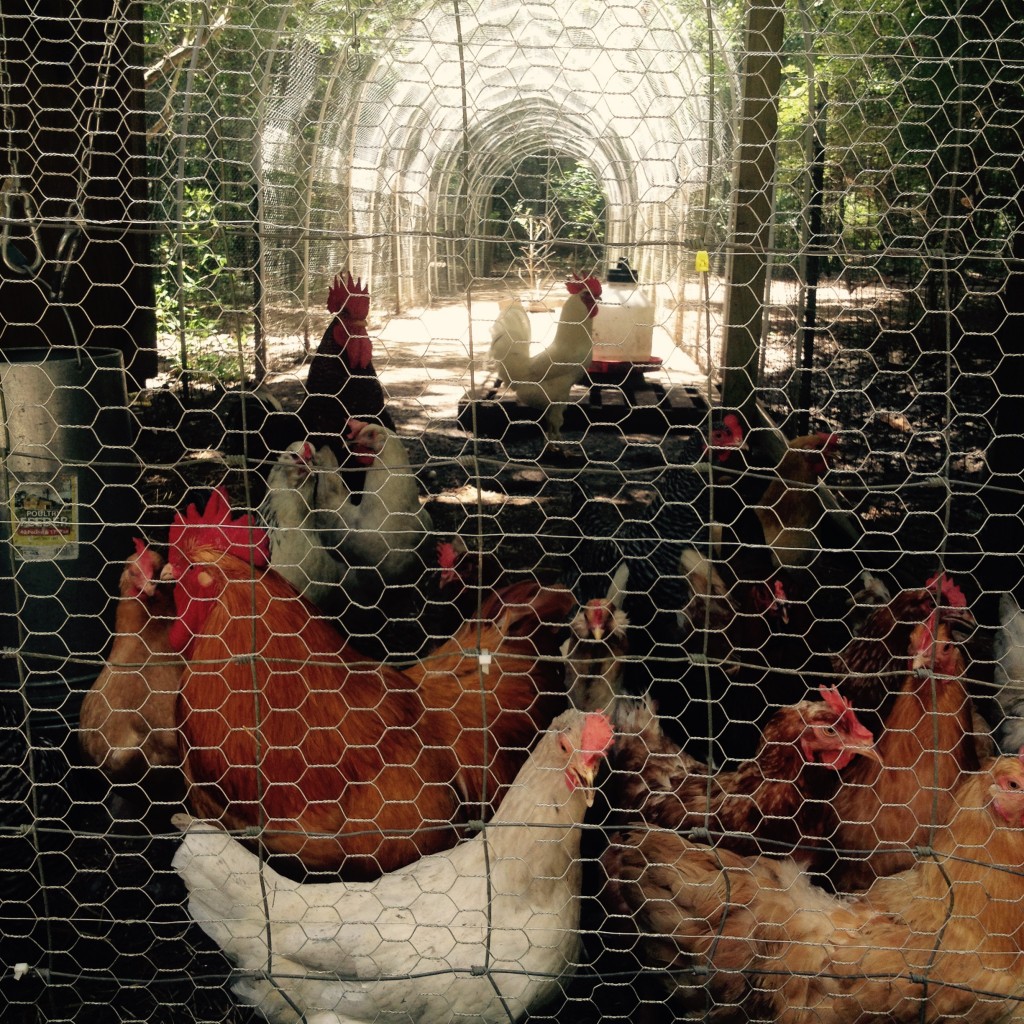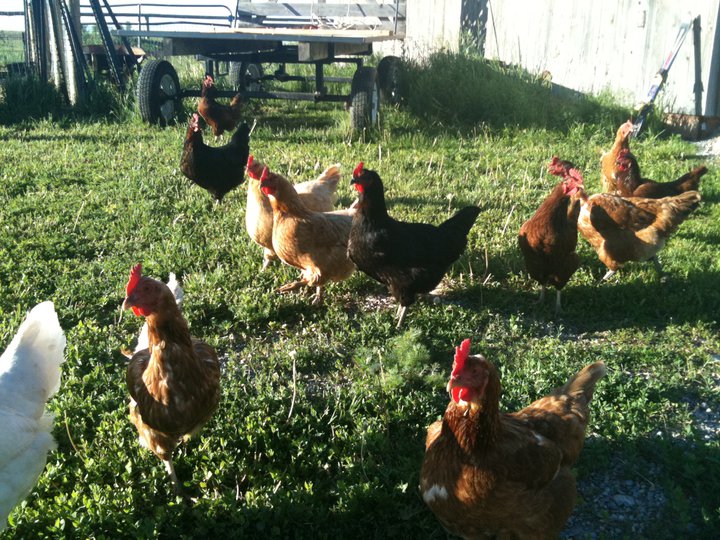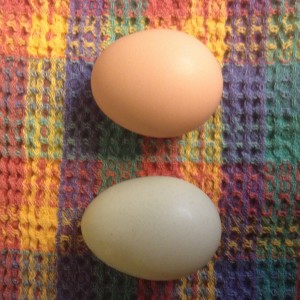Yesterday, I purchased some pastured barn eggs! Fresh!
And, I am reminded of the many benefits of eating organic, pastured eggs. And, there are many!
And, the best thing about that? I know who raises the hens, where they peck, play and lay!
There is no greater value than seeing where your food comes from!
Today, I saw this, and it made me SMILE!

Sarah does her best to keep her laying hens safe from being a “meal” for the predators. There are many who lurk around her 11 acre wooded homestead. Yet, she knows how important it is to allow them to roam free for portions of the day.

But, when you talk to Sarah, you realize, keeping pastured chickens around is not for the faint-at-heart. The battle against raccoons, hawks, dogs, and more, is real.
She’s lost her fair-share of birds, but loves them enough–and the benefits of pastured eggs, to continue on.
Fresh air blows through the coup, and the chickens, chicks and roosters all cohabitate. They have access to sunshine, water, shelter and dirt anytime they chose.
Yet, her birds are still roam free for part of the day.

Compare Fresh Pastured Eggs to Organic Store-Bought Eggs

Recently, I found myself compromising, not buying farm -fresh eggs, due to various factors.
So, I purchased grocery-story, though, “organic,” eggs.
This morning I decided to compare the two options for breakfast.
Again, I was reminded of the compromise as I cooked one fresh farm egg and one conventional.
Here’s what I found.

Though it’s hard to tell in the photo, the egg yolk for the fresh eggs is a brighter yellow (note that the store bought egg is “organic”) and the egg white, more clear and definitive than the one purchased from the grocery store.
You can clearly make your own visual comparisons, but for me, the true difference came down to the taste this morning.
The store-bought, organic egg tasted like “fish.” (And, I am not talking about smoked salmon! That would make it yummy!)
After eating the fresh egg, I could not finish eating the store-bought organic egg. (Blah!!)
Once you’ve tasted an egg raised the way God intended–not trapped in a cage and never seeing the light of day, it’s truly hard to go back to grocery shelf options. (I will NOT go back!! Unless my local farmer is out.) The benefits of pastured organic eggs are too good to skip over.
So, what’s the rest of the big deal?
Let’s Break(down) Egg Terminology
Free-range – Do not confuse this terms with “pastured” eggs. These birds should have access to the outdoors, but time outdoors could be minutes in crowded space. Antibiotics and GMO food sources can still be used. However, they are not overcrowded or have places to perch or nest.
Omega-3 Enhanced – These eggs come from hens fed high amounts of flaxseed and/or fish oil. The hens live in battery cages, and the Omega-3 levels in the eggs are not regulated. In comparative studies, the O-3 eggs had 39% less Arachidonic Acid, an inflammatory Omega-6 fatty acid (Most eat too much O-6). The O-3 eggs had 5 times as much Omega-3 as the conventional eggs. (Even when I compromise, I avoid these eggs because they taste very fishy in a yucky way.)

Cage-free – This term is loosely used, and unregulated. These chickens are often confined indoors, and not allowed outside. They are also not audited by third-party inspectors, unless they are also “certified organic.”
Organic – “Certified organic” are 3rd party verified. These hens are not given antibiotics or hormones. They do have “access” to outdoor areas and are fed an organic diet. HOWEVER, the access to outdoors could still mean over-crowded living conditions on porch with a concrete floor.
Pasture-raised – This is the ultimate, nutrient-dense egg. From hens raised on grassy pastures. But, there is not 3rd party verification for this class of egges, unless they also hold the “certified organic” label.

What are the Benefits of Eating Fresh Pastured Organic Eggs?
They are More Nutrient Dense
There are greater health benefits when you choose to buy your eggs from a local source.
Ideally, you’ll want to select eggs that are raised organically. That means that they are only fed organic food, which reduces the pesticide level in the food you consume.
Testing from 2007 and 2010 confirms that real free-range eggs are more nutrient dense than their commercially raised eggs counterparts.
Here’s the combined data from both studies.
- 33% less cholesterol
- 25% less saturated fat
- 66% more vitamin A
- 3 x’s more omega-3 fatty acids
- 23% more vitamin E
- 7 x’s more beta carotene
Pastured eggs are raised outdoors which bumps up their nutritional value.
Researchers also found that eggs from pastured hens had a Vitamin D content 3 – 6 times higher than confined hens. The direct sunlight is responsible for the higher content. These eggs give you 63-126% greater Vit D levels than conventional eggs.
The dramatically superior nutrient levels are most likely the result of the differences in diet between free ranging, pastured hens and commercially farmed hens.
The best option?

#1 Eggs from pastured-raised hens, who eat only naturally found sources.
#2 Eggs from pastured-raised hens, supplemented only with organic food.

Tips on how to keep pastured organic eggs fresh
- When in abundance, freeze eggs in muffin pan, pop them out, and put into freezer container to use when needed. When you are ready to use them, allow to thaw in refrigerator overnight. Use within 6 months. (Though I am not a fan of plastic wrap, it is helpful when removing the frozen egg. Simply, put some plastic wrap it in the muffin pan before cracking the egg.)
- When you want “boiled eggs” and your eggs are fresh, it’s better to either steam them or bake them when wanting to eat them “boiled.” I have had success with boiling the traditional way for 10 minutes, then immediately running them under cold water and peeling. If I let them sit in the cool water for a while, and then try to peel, I do not get a “clean peel.”
- If it wait at least a week to boil as the white pulls away from the shell, making them easier to peel when boiled.
- Store in a carton in the frig or a nice, cool space. (2 weeks or more out of the frig, the eggs may spoil.)
- In Europe, fresh eggs are typically NOT washed and NOT refrigerated. The natural coating on the fresh egg acts as a natural protectant. ( The eggs still will tend to spoil quicker when not refrigerated.)
- In a grocery store, eggs can be sold as “Fresh” for up to 30 days from the time they are placed in cartons–or 45 days if a “use by” date is applied
- Eggs, if stored properly in a refrigerator, can keep for more than 6 weeks after they’ve been laid.
- Places to buy fresh / organic / pastured eggs:
-
Local Harvest for Organic Food Co-Ops in your area
-
Check for Good Eggs in your area
-
Check the USDA Local Farmer’s Market Location
-
Ask your Facebook Friends for suggestions in your area — You likely have friends who raise them! I have a few!
How to choose from the organic options out there:
I hope this helps you sort through all of the egg ya-ya of late. Ask around to find the freshest eggs possible. And, share your new-found knowledge with your friends!

Geaux Organic for LIFE!
Thank you to Blair Kribs for photos and Sarah Plaisance for photos ops at her homestead.
Jennifer L Griffith is an active and successful Louisiana Real Estate Agent. She’d love to help you find the next place where your heart belongs!


Leave a Reply
You must be logged in to post a comment.